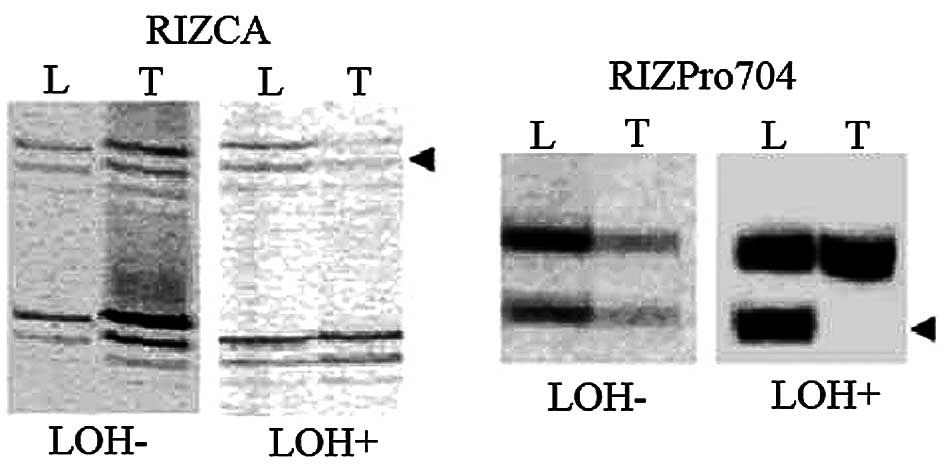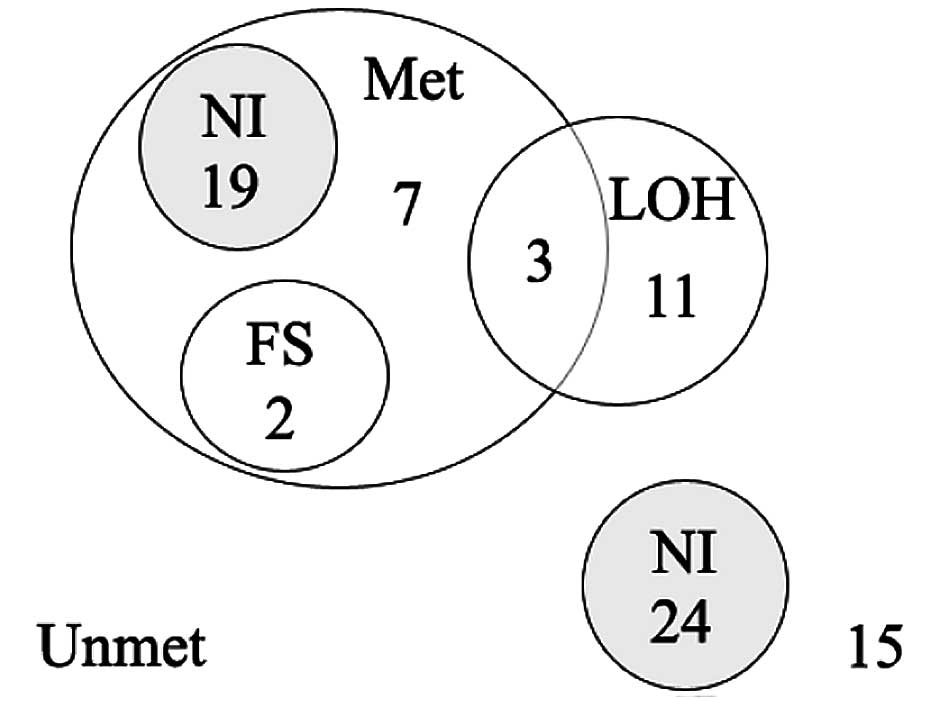|
1.
|
Sripa B and Pairojkul C:
Cholangiocarcinoma: lessons from Thailand. Curr Opin Gastroenterol.
24:349–356. 2008. View Article : Google Scholar : PubMed/NCBI
|
|
2.
|
Sripa B, Kaewkes S, Sithithaworn P, et al:
Liver fluke induces cholangiocarcinoma. PLoS Med. 4:e2012007.
View Article : Google Scholar : PubMed/NCBI
|
|
3.
|
Limpaiboon T, Tapdara S, Jearanaikoon P,
Sripa B and Bhudhisawasdi V: Prognostic significance of
microsatellite alterations at 1p36 in cholangiocarcinoma. World J
Gastroenterol. 12:4377–4382. 2006.PubMed/NCBI
|
|
4.
|
Buyse IM, Takahashi EI and Huang S:
Physical mapping of the retinoblastoma interacting zinc finger gene
RIZ to D1S228 on chromosome 1p36. Genomics. 34:119–121. 1996.
View Article : Google Scholar : PubMed/NCBI
|
|
5.
|
Liu L, Shao G, Steele-Perkins G and Huang
S: The retinoblastoma interacting zinc finger gene RIZ produces a
PR domain-lacking product through an internal promoter. J Biol
Chem. 272:2984–2991. 1997. View Article : Google Scholar : PubMed/NCBI
|
|
6.
|
Xie M, Shao G, Buyse IM and Huang S:
Transcriptional repression mediated by the PR domain zinc finger
gene RIZ. J Biol Chem. 272:26360–26366. 1997. View Article : Google Scholar : PubMed/NCBI
|
|
7.
|
Chadwick RB, Jiang GL, Bennington GA, et
al: Candidate tumor suppressor RIZ is frequently involved in
colorectal carcinogenesis. Proc Natl Acad Sci USA. 97:2662–2667.
2000. View Article : Google Scholar : PubMed/NCBI
|
|
8.
|
Jiang G, Liu L, Buyse IM, Simon D and
Huang S: Decreased RIZ1 expression but not RIZ2 in hepatoma and
suppression of hepatoma tumorigenicity by RIZ1. Int J Cancer.
83:541–546. 1999. View Article : Google Scholar : PubMed/NCBI
|
|
9.
|
He L, Yu JX, Liu L, et al: RIZ1, but not
the alternative RIZ2 product of the same gene, is underexpressed in
breast cancer, and forced RIZ1 expression causes G2-M cell cycle
arrest and/or apoptosis. Cancer Res. 58:4238–4244. 1998.PubMed/NCBI
|
|
10.
|
Jiang GL and Huang S: Adenovirus
expressing RIZ1 in tumor suppressor gene therapy of
microsatellite-unstable colorectal cancers. Cancer Res.
61:1796–1798. 2001.PubMed/NCBI
|
|
11.
|
Steele-Perkins G, Fang W, Yang XH, et al:
Tumor formation and inactivation of RIZ1, an Rb-binding member of a
nuclear protein-methyltransferase superfamily. Genes Dev.
15:2250–2262. 2001. View Article : Google Scholar : PubMed/NCBI
|
|
12.
|
Pastural E, Takahashi N, Dong WF, et al:
RIZ1 repression is associated with insulin-like growth factor-1
signaling activation in chronic myeloid leukemia cell lines.
Oncogene. 26:1586–1594. 2007. View Article : Google Scholar : PubMed/NCBI
|
|
13.
|
Abbondanza C, Medici N, Nigro V, et al:
The retinoblastoma-interacting zinc-finger protein RIZ is a
downstream effector of estrogen action. Proc Natl Acad Sci USA.
97:3130–3135. 2000. View Article : Google Scholar : PubMed/NCBI
|
|
14.
|
Carling T, Kim KC, Yang XH, Gu J, Zhang XK
and Huang S: A histone methyltransferase is required for maximal
response to female sex hormones. Mol Cell Biol. 24:7032–7042. 2004.
View Article : Google Scholar : PubMed/NCBI
|
|
15.
|
Gazzerro P, Abbondanza C, D'Arcangelo A,
et al: Modulation of RIZ gene expression is associated to estradiol
control of MCF-7 breast cancer cell proliferation. Exp Cell Res.
312:340–349. 2006.PubMed/NCBI
|
|
16.
|
Kahlert S, Nuedling S, van Eickels M,
Vetter H, Meyer R and Grohe C: Estrogen receptor alpha rapidly
activates the IGF-1 receptor pathway. J Biol Chem. 275:18447–18453.
2000. View Article : Google Scholar : PubMed/NCBI
|
|
17.
|
Tokumaru Y, Nomoto S, Jeronimo C, et al:
Biallelic inactivation of the RIZ1 gene in human gastric cancer.
Oncogene. 22:6954–6958. 2003. View Article : Google Scholar : PubMed/NCBI
|
|
18.
|
Carling T, Du Y, Fang W, Correa P and
Huang S: Intragenic allelic loss and promoter hypermethylation of
the RIZ1 tumor suppressor gene in parathyroid tumors and
pheochromocytomas. Surgery. 134:932–940. 2003. View Article : Google Scholar : PubMed/NCBI
|
|
19.
|
Oshimo Y, Oue N, Mitani Y, et al: Frequent
epigenetic inactivation of RIZ1 by promoter hypermethylation in
human gastric carcinoma. Int J Cancer. 110:212–218. 2004.
View Article : Google Scholar : PubMed/NCBI
|
|
20.
|
Akahira J, Suzuki F, Suzuki T, et al:
Decreased expression of RIZ1 and its clinicopathological
significance in epithelial ovarian carcinoma: correlation with
epigenetic inactivation by aberrant DNA methylation. Pathol Int.
57:725–733. 2007. View Article : Google Scholar
|
|
21.
|
Poetsch M, Dittberner T and Woenckhaus C:
Frameshift mutations of RIZ, but no point mutations in RIZ1 exons
in malignant melanomas with deletions in 1p36. Oncogene.
21:3038–3042. 2002. View Article : Google Scholar : PubMed/NCBI
|
|
22.
|
Fang W, Piao Z, Simon D, Sheu JC and Huang
S: Mapping of a minimal deleted region in human hepatocellular
carcinoma to 1p36.13–p36.23 and mutational analysis of the RIZ
(PRDM2) gene localized to the region. Genes Chromosomes Cancer.
28:269–275. 2000.PubMed/NCBI
|
|
23.
|
Piao Z, Fang W, Malkhosyan S, et al:
Frequent frameshift mutations of RIZ in sporadic gastrointestinal
and endometrial carcinomas with microsatellite instability. Cancer
Res. 60:4701–4704. 2000.PubMed/NCBI
|
|
24.
|
Limpaiboon T, Khaenam P, Chinnasri P, et
al: Promoter hyper-methylation is a major event in hMLH1 gene
inactivation in liver fluke-related cholangiocarcinoma. Cancer
Lett. 217:213–219. 2005. View Article : Google Scholar : PubMed/NCBI
|
|
25.
|
Herman JG, Graff JR, Myohanen S, Nelkin BD
and Baylin SB: Methylation-specific PCR: a novel PCR assay for
methylation status of CpG islands. Proc Natl Acad Sci USA.
93:9821–9826. 1996. View Article : Google Scholar : PubMed/NCBI
|
|
26.
|
Limpaiboon T, Krissadarak K, Sripa B, et
al: Microsatellite alterations in liver fluke-related
cholangiocarcinoma are associated with poor prognosis. Cancer Lett.
181:215–222. 2002. View Article : Google Scholar : PubMed/NCBI
|
|
27.
|
Yamamoto H, Sawai H and Perucho M:
Frameshift somatic mutations in gastrointestinal cancer of the
microsatellite mutator phenotype. Cancer Res. 57:4420–4426.
1997.PubMed/NCBI
|
|
28.
|
Hasegawa Y, Matsubara A, Teishima J, et
al: DNA methylation of the RIZ1 gene is associated with nuclear
accumulation of p53 in prostate cancer. Cancer Sci. 98:32–36. 2007.
View Article : Google Scholar : PubMed/NCBI
|
|
29.
|
Alvaro D, Barbaro B, Franchitto A, et al:
Estrogens and insulin-like growth factor 1 modulate neoplastic cell
growth in human cholangiocarcinoma. Am J Pathol. 169:877–888. 2006.
View Article : Google Scholar : PubMed/NCBI
|
|
30.
|
Grundberg E, Carling T, Brandstrom H, et
al: A deletion polymorphism in the RIZ gene, a female sex steroid
hormone receptor coactivator, exhibits decreased response to
estrogen in vitro and associates with low bone mineral density in
young Swedish women. J Clin Endocrinol Metab. 89:6173–6178. 2004.
View Article : Google Scholar
|
|
31.
|
Stolk L, van Meurs JB, Arp PP, Hofman A,
Pols HA and Uitterlinden AG: The RIZ Pro704 insertion-deletion
polymorphism, bone mineral density and fracture risk: the Rotterdam
study. Bone. 42:286–293. 2008. View Article : Google Scholar : PubMed/NCBI
|
|
32.
|
Du Y, Carling T, Fang W, Piao Z, Sheu JC
and Huang S: Hypermethylation in human cancers of the RIZ1 tumor
suppressor gene, a member of a histone/protein methyltransferase
superfamily. Cancer Res. 61:8094–8099. 2001.PubMed/NCBI
|


















